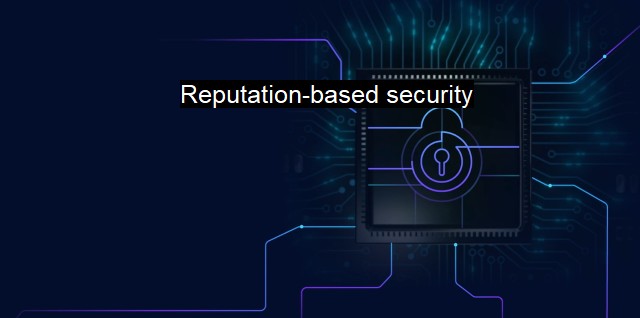What is Reputation-based security?
Understanding the Power of Reputation-Based Security in Cybersecurity: How Analysis of Feedback and User Behaviour Protects Against Malware
Reputation-based security is a sophisticated and browse apprised approach towards ensuring cybersecurity that uses aggregate information collected about the behaviour, history, and actions associated with a source to determine its trustworthiness. This security strategy calculates a security reputation score for entities such as software publishers, IP addresses, websites, and even files. The reputation is founded on previous behaviour or affiliations with other entities that have or don't have a good reputation. Security solutions can then utilize these reputations to restrict the operations they can perform or permeate the access they have to clear resources.The crux of reputation based security is in understanding the modularity of cyber threats. Unlike traditional security methods that list either malicious or innocuous elements, reputation-based security identifies those elements that rank between the innocent and malicious ends of the spectrum. It helps in picking out the 'grayware' - software that isn't necessarily harmful but can exacerbate the system’s vulnerabilities or stress the bandwidth.
The reputation-based model curbs usage from unknown or distrustful sources based upon their purported characteristics. More specifically in its application within antivirus software realms, this model enables efficient protection against even those threats and vulnerabilities that are not present in the signature databases of existing antiviruses. It targets polymorphic and heuristic threats that legitimate security couldn't identify or retaliate against. With the proliferation of zero-day threats that utilize novel, undocumented methodologies to conduct illicit activities, reputation-based security serves as the barricade against this rising tide unleashed by more subtle attacker strategies and ever-evolving malware.
Reputation-based security exists at the forefront of dynamic, adaptive defense systems, intercepting threats in real-time. Through continuous monitoring measures and leveraging its holistic view of networks, it represses unauthorized access by tying it to past behaviour, and offsetting trust in largely unverified and virgin territories of the internet.
Another key strength that leans into working with this perspective would be the sense of real-time analysis and insights derived out of the perpetual process. By working against unaudited behaviours, this strategy enables early threat detection and its mitigation, providing the metered response and the capability to ward off the threats before they transform into breaches.
It is compelling to note that reputation-based computer security is not a standalone savior meant to replace traditional methodologies - rather, they supplement each other, creating a layered and comprehensive security approach. Antivirus software incorporates reputation-based methods to improve overall security strategies. It complements signature-based recognition techniques, adding an extra layer of defenses and increasing the level of exigency that antivirus software can manage in case of escalating threats.
Reputation-based security is certainly not infallible. Ideally, it should be eight out of ten, since placing false positives or false negatives could stain the reputation of legitimate resources and cause disruptions in the ecosystem. This system could also be manipulated by clever hackers equipped with doorway domains and botnets to artificially inflate a negative entity's reputation score.
All this tension ultimately highlights the importance of an integrated, multifaceted cybersecurity approach where reputation-based models represent an integral part of a comprehensive security toolkit alongside persistent development in the IT sector, further propelling the need for adopting graded security measures. Thereby, to match pace, steps must be administrated against disruptive threats ranging from deep learning and AI to IoT—the realization of consolidating and balancing a multifarious range of tools, including reputation-based security methods for an enriching, comprehensive, and robust cybersecurity framework.

Reputation-based security FAQs
What is reputation-based security?
Reputation-based security is a type of cybersecurity approach that uses data and analytics to assess the trustworthiness of files, websites, and other digital entities. The approach identifies potential security threats based on the reputation of the source or origin of the entity.How does reputation-based security differ from traditional antivirus approaches?
Traditional antivirus approaches rely on signature-based detection, which means they search for specific virus patterns. Reputation-based security, on the other hand, uses a broader approach that looks at the source or origin of the file or website being scanned. This allows it to catch previously unseen threats and helps to prevent zero-day attacks.What are the advantages of using reputation-based security?
Reputation-based security has several advantages, including the ability to catch previously unseen threats, faster detection times, and a lower rate of false positives. It also allows for better protection against targeted attacks, as it can identify the source of a threat and block it before it can do any harm.How can businesses implement reputation-based security?
Businesses can implement reputation-based security by investing in security solutions that use this approach, such as next-generation antivirus or endpoint protection software. It's also important for businesses to educate employees on safe computing practices, such as not clicking on suspicious links or downloading unfamiliar files.| | A | | | B | | | C | | | D | | | E | | | F | | | G | | | H | | | I | | | J | | | K | | | L | | | M | |
| | N | | | O | | | P | | | Q | | | R | | | S | | | T | | | U | | | V | | | W | | | X | | | Y | | | Z | |
| | 1 | | | 2 | | | 3 | | | 4 | | | 7 | | | 8 | | |||||||